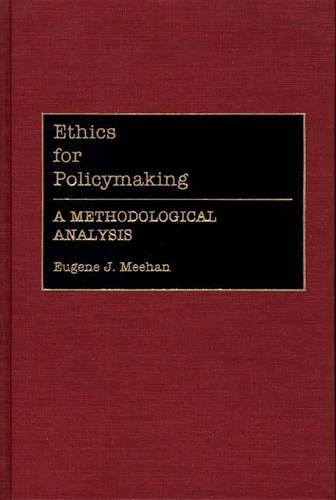
Ethics for Policymaking: A Methodological Analysis
(Hardback)
Publishing Details
Ethics for Policymaking: A Methodological Analysis
By (Author) Eugene Meehan
Bloomsbury Publishing PLC
Praeger Publishers Inc
23rd April 1990
United States
Classifications
Tertiary Education
Non Fiction
Central / national / federal government policies
320.6
Physical Properties
Hardback
248
Description
In this book the author presents a sustained argument in favour of a particular perspective on the relationship between normative judgements or arguments and policymaking, based upon a radically different approach to providing a justification for actions, whether individual or collective. Meehan's overall objective is to establish the knowledge requirement, empirical and normative for defensible/corrigible policymaking and thereby to produce an analytic apparatus that can be used to improve intellectual performance in the conduct of real world affairs.
Reviews
With this work, Meehan continues his decades long analysis of problems involved in formulating policy alternatives in a rationally grounded social science. His stated objective has been 'to establish the knowledge requirements, empirical and normative, for defensible or corrigible policymaking.'The previous 'empirical' discussion centered around the development of an educational program designed to train students of policy analysis in the 'Three As' acquiring, augmenting, and applying knowledge. In the present work, he turns his attention to the normative requirements for directed human activity. His unit of analysis is the 'action', not the actor, and the analysis itself borrows heavily from both behavioralism and utilitarianism, yet it is purposefully unconstrained by these admittedly limiting points of view. His utilitarian aspect more resembles that of the later Mill than the earlier Bentham. Nor does the analysis remain at one level, instead Meehan shifts easily between metaphysical/epistemological considerations and concrete policy difficulties. The complex ideas advanced are well illustrated with many specific examples. The book is thoroughly enjoyable, but, although not highly technical--it is eminently quotable--it is written in a discipline-specific language that may not be accessible to the average reader. Upper-division undergraduates and above.-Choice
"With this work, Meehan continues his decades long analysis of problems involved in formulating policy alternatives in a rationally grounded social science. His stated objective has been 'to establish the knowledge requirements, empirical and normative, for defensible or corrigible policymaking.'The previous 'empirical' discussion centered around the development of an educational program designed to train students of policy analysis in the 'Three As' acquiring, augmenting, and applying knowledge. In the present work, he turns his attention to the normative requirements for directed human activity. His unit of analysis is the 'action', not the actor, and the analysis itself borrows heavily from both behavioralism and utilitarianism, yet it is purposefully unconstrained by these admittedly limiting points of view. His utilitarian aspect more resembles that of the later Mill than the earlier Bentham. Nor does the analysis remain at one level, instead Meehan shifts easily between metaphysical/epistemological considerations and concrete policy difficulties. The complex ideas advanced are well illustrated with many specific examples. The book is thoroughly enjoyable, but, although not highly technical--it is eminently quotable--it is written in a discipline-specific language that may not be accessible to the average reader. Upper-division undergraduates and above."-Choice
Author Bio
EUGENE J. MEEHAN is Curators' Professor of Political Science and Public Policy Administration, University of Missouri, St. Louis.
